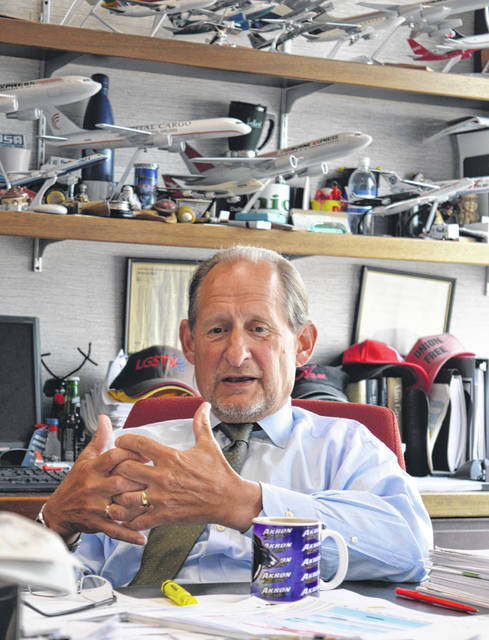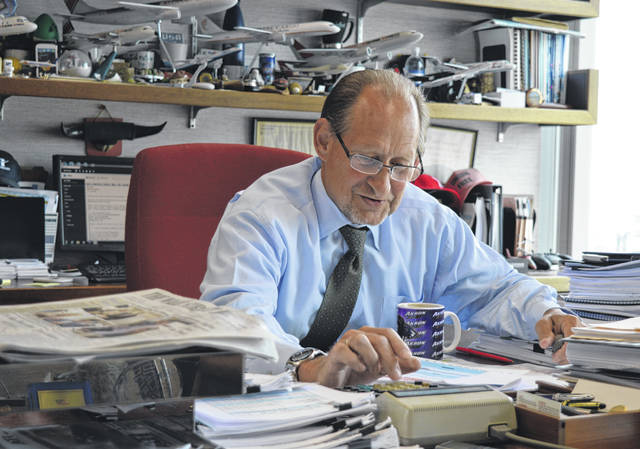


WILMINGTON — “It’s still a surprise to me today — the resiliency in the community as a whole — considering the number of jobs that were lost.”
Ten years after the DHL meltdown at the air park, Air Transport Services Group CEO Joe Hete said what many around here — other than incurable optimists — have thought: Overall, the resiliency of Clinton Countians in the fallout of a jobless crisis has been remarkable.
For his part, Hete attributes it “to the fortitude of the people around here.”
Hete was in Florida for a meeting in late May 2008 when he was told that the new head of DHL was coming to Wilmington to see him. So he flew to Columbus and due to time constraints he was brought back to the air park in a little Cessna airplane.
In a conference room across the hall from Hete’s office, the two met and Ken Allen told him about DHL’s plan to partner with UPS.
“I just looked at him and I couldn’t believe what I was hearing, and I just said, ‘Do you realize how stupid that is?’”
Allen was the fourth CEO of DHL in the five years since it purchased Airborne Express, and he wasn’t the person who set up the planned deal with UPS, said Hete.
The news — not just of a scale-back, but basically abandoning the Wilmington hub — shocked everyone, he said. Moreover, “It just made zero sense. What are you thinking? You’re going to turn over all your core business to your biggest competitor?”
DHL was losing hundreds of millions of dollars annually in its U.S. operations, and Hete said ABX Air tried everything to help them out along the way.
Prior to May 2008, Hete went to Germany and gave a presentation on something he believes would have annually meant “a huge savings in terms of redoing their air operations.” They thought the presentation was very interesting, he said, but didn’t follow through on it.
After DHL’s bombshell announcement, the balance sheet for their U.S. shipping operations went from bad to even worse as they started losing their domestic U.S. customers “like it was going out of style” to UPS and FedEx, said Hete.
Ten years later, DHL is a major customer of ATSG and ironically ATSG is a much stronger company from a financial standpoint than it was in 2008.
One key to ATSG’s survival and success, said Hete, was a lot of hard work on people’s part to come up with a restructured business plan for the company. Another key is the contributions by all the retained employees to ensure the company’s survival by accepting less benefits and less pay, he added.
Everybody across the board took pay cuts. In addition, the unionized pilots at ABX and the rest of the employees contributed by going along when the company froze their defined benefit pension plans which helped ATSG with cash flow.
AMES (Airborne Maintenance & Engineering Services), one part of the ATSG group of companies, is a good example, said the CEO.
“We wanted to hold on to as many of those jobs as we could. But the mechanics over there were at airline industry wages and we were now going into the MRO (maintenance, repair and overhaul) business and the MRO business is a whole different animal. So, many of the mechanics ended up taking 20, 30 percent pay cuts,” he said.
Mechanics who were retained at the air park probably took the biggest hit in compensation, said Hete.
He said there was an effort to hold on to as much of the core competencies developed by ATSG and Airborne Express over the years as possible in order to salvage jobs because they knew they were a big player in the community.
“When you’re going to let go as many people as we did, we tried every which way we could to justify holding on to people.”
He said, “We have a vested stake in the community here. We wanted to preserve the community as best we could, and as many jobs as we could, so that was a key driver for us.”
One thing that “still sticks in my craw to this day” is what Hete views as a lack of involvement from President Obama after he promised in Dayton during the 2008 presidential campaign that he would take up the cause.
“Did you ever see Obama come here? Did you ever hear anything out of Obama to try to salvage a deal at that point in time? No. I can’t say with any degree of certainty, but once he was elected president and before DHL said that they were going to go back to CVG [Cincinnati/Northern Kentucky International Airport], there was still an opportunity for somebody to put some pressure on to keep them here in Wilmington, Ohio, and nothing ever happened.”
Rebuilding the company
While the willingness of employees to accept less compensation and the willingness of people to give “an inordinate amount of time” reworking the company’s business plan were key, ultimately the most crucial factor for the company’s survival was having the 767 freighter aircraft as an asset, he said.
The basis for the business plan essentially was that ATSG had an asset nobody else had — the 767 freighter — and furthermore it was in demand, Hete said.
Investors and others had figured that without DHL, ATSG would go out of business, and “that’s why [ATSG’s] stock value dropped like a stone,” he said.
At its low, ATSG was at 12 cents per share — actually less than the value of one airplane.
Looking at the numbers, then and now
A month after the announcement in 2008, ATSG had a total of 122 planes in its fleet. At the end of first quarter 2010, when ATSG had completed its restructuring and also had signed a new deal with DHL, the Wilmington-based corporation had 66 total planes in service. At the end of first quarter 2018, there were 70 planes in service.
The total number of ATSG employees worldwide a month after the 2008 announcement was 11,189. At the end of first quarter 2010, that number had nosedived to 2,438. At the end of first quarter 2018, the number of ATSG employees stood at 3,423 (roughly a 1,000 more than eight years ago).
As for company revenue, in 2008 ATSG’s revenue was $1.6 billion. In 2010, it had dropped to $667 million. And in 2017, revenue had risen to $1.07 billion.
“So we built the company back up,” said Hete.
In terms of profit, ATSG finished 2008 at $35 million; finished 2010 at $63 million; and finished last year at $96 million.
Reach Gary Huffenberger at 937-556-5768.




